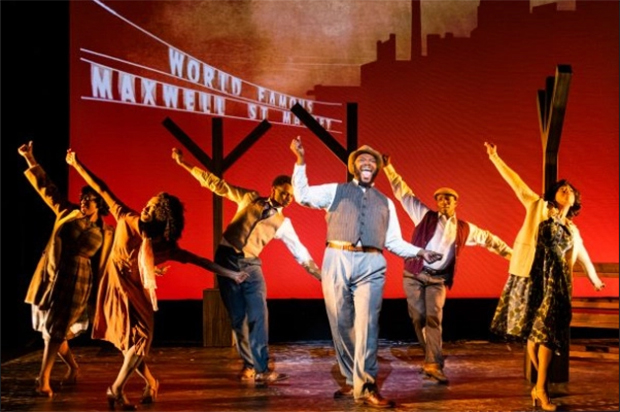NYMF Reviews 2019: Flying Lessons and Till
Historical figures come alive in two new shows at the New York Musical Festival.

(© Hector Sanchez Jr.)
Flying Lessons
By Sarah Grace Drinkwine
The story of Flying Lessons is deceptively simple: Isabella (Esmeralda Nazario) is a middle-schooler who finds herself stuck while writing a paper about a great historical figure, only to be visited by the happy-to-help ghosts of Amelia Earhart (Megan Valle) and Frederick Douglass (Brandon Martin). On its surface, this premise may not seem compelling, but when paired with writing that combines empathy with nuance and intelligence, it absolutely is.
The stories of Amelia Earhart and Frederick Douglass are not sugarcoated or dumbed down. These are condensed versions, but book writer and lyricist Donald Rupe also doesn't shy away from depicting the barriers that both of these figures faced in their lifetimes. Special commendation goes to the music montage "Less Than Human," in which Douglass recounts memories of all of the myriad ways it was reinforced that he was not a person; this goes a long way in driving home just how radical his ideas were in his time, and how much bravery it actually took to challenge that cultural status quo.
A similar treatment is given to Amelia Earhart, who had to battle very real sexism in her journey to become a pilot, but ultimately loved being in an airplane enough to risk her life every time she entered the cockpit — an occurrence that does come to fruition for her.
Bella and her complicated relationship with her mother, Lydia (Desiree Montes), are treated with an equally deft hand. Because of Lydia's status as a single mother — one who must work double shifts to make ends meet — Bella continually finds herself left to her own devices, both emotionally and literally having to "pick up the slack" of her mom's absence. An incredibly fine balance is struck here, one where Bella is clearly frustrated and angry, but also knows that the situation can't be helped. It's a tough position for any kid to be in, and when Bella loses her temper, it's clearly shown to be because of that anxiety rather than outright malice. More than one fantastic number takes place in this context, and all execute this tension admirably.
One small criticism could be made in regards to thematic cohesion. It is implied that Earhart helped to break down the boundaries that allow Lydia to have her own career, but given that Lydia is a maid — a job considered culturally acceptable for women for centuries — this connection ends up going nowhere, and makes the mother-daughter resolution feel more than a little flimsy. Ultimately, however, Flying Lessons truly soars where it counts most.

(© Russ Rowland)
Till
By Pete Hempstead
Emmett Till would have been 78 years old on July 25, the day I saw Till, a new musical running as part of the New York Musical Festival. Emmett, a black youth, was murdered in Mississippi at the age of 14 by a white shop owner who took offense when he heard that the child might have whistled at his wife. The shop owner and an accomplice were tried and acquitted. Emmett's lynching and the pernicious miscarriage of justice later became a catalyst of the civil rights movement.
I was skeptical about how a musical could be made out of an occurrence so horrific, particularly when the story should arouse not just sorrow but intense outrage in everyone who sees and hears it. Till does those things, but it does more. Composer Leo Schwartz, who wrote the book with D.C. Cathro, has created a beautiful tribute to Emmett and his mother, Mamie Till. Under the sensitive direction of N.J. Agwuna, Till soars with hope as it challenges us to stop the killing of innocent black men.
Schwartz uses gospel, blues, and jazzy New Orleans-style rhythms to tell the story of Emmett's life in Chicago before he decided to visit family in Money, Mississippi. We meet Emmett (Taylor Blackman), a young man full of dreams and potential, as he sings the charming "Proud of Me" to his mother (Denielle Marie Gray). The company later gets together for the jazzy "Money, Mississippi," jauntily choreographed by Kenny Ingram and featuring the rousing vocals of Dwelvan David.
Other members of the talented cast, including Tyla Collier, Judith Franklin, and Devin Roberts (all superb singers), lend their voices to songs like the liberating "Set That Woman Free," the instructive "Jim Crow," and the moving love song "I Suppose." Upon word of Emmett's death, Gray sings the heartbreaking "I Want You Back" as we feel tears of anguish and rage well up.
Seeing the show on Emmett's birthday heightened its impact for me. He was a young man who should still be with us today. We should be angry when we hear Emmett's story, just as we should be angry at the outrages still perpetrated against people of color (media designer Matthew Herman projects a list of names of those we've lost on a screen behind the actors in the show's final moments). But a musical will not solve these problems. That's for the folks in the audience to do.







